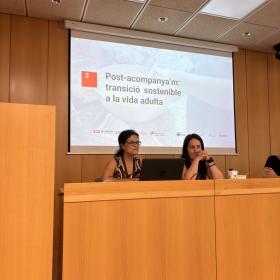The project develops support communities for emancipation for young people with mental disorders and former guardians, in order to accompany them in facilitating their full integration into adult life.
At Suara Cooperativa, we are proud to participate in the creation of the support community for young people with highly complex mental health disorders, in collaboration with the Hospital Sant Joan de Déu de Barcelona and the University of Vic.
This project was born as a response to the need to provide continuous support to those young people who, after receiving intensive treatment at the Acompanya’m Residential Educational Therapeutic Unit (UTER), cannot return to their family home nor are they autonomous enough to live independently.
Accompanying young people who have been left out of guardianship
Young people with an associated mental health condition can temporarily reside in an assisted living facility, where they receive specialized care and support from educators and professionals with experience in mental health. The Post-accompaniment'm Project completes the network of transition programs to adulthood, addressing the lack of services specifically designed for young people over 18 with particular needs and high vulnerability.
The support community not only facilitates a sustainable transition to adulthood, but also responds to the recommendations of several studies on the emancipation of young people from care. Providing a stable residential resource and professional support is essential to reduce the stress associated with the uncertainty of the future. In this way, we empower these young people and encourage them to set realistic goals.
Some of the problems they want to answer:
- Institutional dependence that reduces the possibilities of training the skills of self-determination, empowerment, decision-making, risk assessment, etc. in ex-guardian youth with complex social, family and health problems, making it difficult, however, to leave child protection centers.
- The lack of stable references at such a crucial moment as deinstitutionalization and the beginning of an emancipation process.
- The lack of housing opportunities, social network and family support to achieve emancipation.
The challenges we want to address are:
- Accompany young adults with mental health problems and risk of social exclusion, especially the most vulnerable (they are part of the protection system, justice, homelessness, etc.) so that at the time of transition to adulthood they have greater opportunities to build their life project while consolidating their autonomy.
- Promote the deinstitutionalization of young people with mental health problems by creating safe spaces for themselves.
- Implement a new model of community of coexistence for a sustainable transition to adulthood for a highly complex population at a social and health level.
- Avoid the chronicity and deterioration of mental health and the increase in psychological distress due to social conditions linked to the lack of housing opportunities, family support, social network and interpersonal relationships and training and employment deficiencies.
- Create and consolidate a "social network" for young adults in their own environment and natural environment.
- Commit to an early/preventive intervention model for young adults that empowers them as actors of their own autonomy and avoids chronicity and institutionalization.
The Post Acompanya'm project is promoted by 4 partners:
- Hospital Sant Joan de Déu and the Acompanya'm Unit.
- Fundació Sant Joan de Déu and its action in Social Innovation.
- Suara Cooperativa.
- University of Vic-Centre for Social and Health Studies (CESS).
This project has been funded by the EU - Next Generation EU




